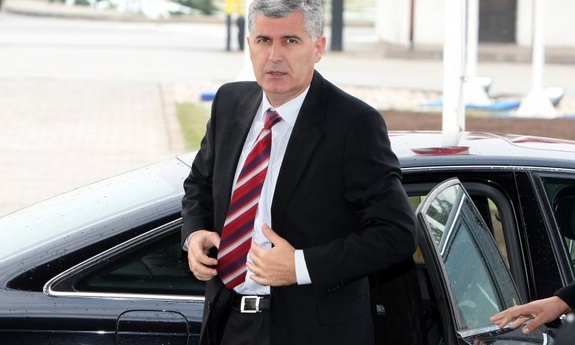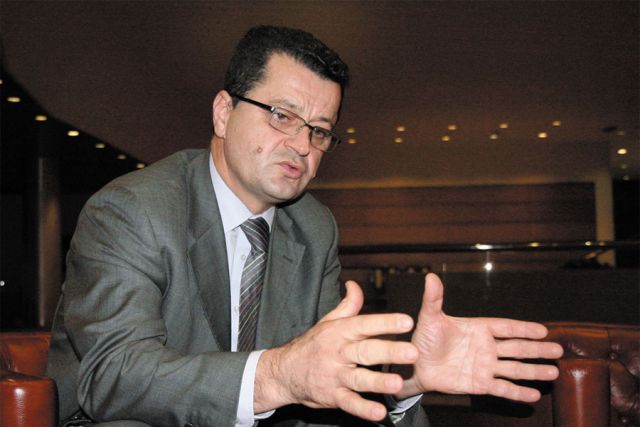The Croats
In 2006 and 2010 Željko Komšić, then of the SDP, won the Croat post of the state presidency. In 2010, he tripled the amount of votes he received in 2006 and could easily claim the mantle of most popular politician in the country. There was a problem, however. Komšić, an ethnic Croat who prefers to identify simply as a Bosnian, won more votes than there are thought to be Croats in the whole of BiH. Remarkably, Komšić had won over not only the progressive, urban segments of the Croat population, he’d also convinced a large portion of the Bosniak and otherwise Bosnian electorate to vote for him. Some joked that while Izetbegović Jr. was the Bosniak president, Komšić was the Bosnian.
To the nationalist Croatian Democratic Union (HDZ), however, this was systematic marginalization of the Croat population and a perversion of the Dayton electoral process. It was true that the two (!) HDZs had divided the majority of the ethnic Croat vote in BiH but Komšić’s success also reflected a long-standing split within the Croat community in BiH more broadly. On the one hand, the HDZ represents the rural, conservative, nationalists whose primary political objective is the recreation of the war-time Herzeg-Bosna or what has since become known simply as the “third entity.”
Closely aligned with Dodik’s SNSD, the HDZ has increasingly became a party localized to western Herzegovina, largely uninterested in the more moderate opinions of Croats in central Bosnia, Sarajevo, or the RS. It is this increasingly right-tilting swerve that the HDZ1990, Komšić’s DF, the SDP, and a smattering of smaller Croat parties are seeking to exploit. When rumors began spreading that the outspoken Prof. Slavo Kukić would run for the DF as Croat candidate for the state presidency, he was viciously assaulted. Kukić minced no words, blaming hired goons associated with the “fascists in the HDZ.”
Since then, a string of bizarre incidents have befallen the DF, the result of which has been that their candidate for the state presidency is a virtual no-name, Anto Popović. The race thus looks to come down to the long-time leader of the HDZ, Dragan Čović, and the newly-minted leader of the breakaway HDZ1990, Martin Raguž.
Dragan Čović

The longest-serving HDZ leader since its founding, former member of the state presidency, removed from office on suspicion of corruption by then High Representative Paddy Ashdown. Čović holds a unique distinction among BiH’s party heads, in that he has actually been convicted of corruption charges, although these were later dropped. Čović has spent the last eight years attempting to convince every foreign national within ear shot that the only solution to BiH’s crippling stagnation is the further ethno-segmentation of the country, insisting on something he refers to as the “Croat Question.” In the meantime, the city of Mostar, the HDZ’s headquarters, has not been able to hold local elections since 2008 due to a paralyzing disagreement between the party in question and the SDA. It’s difficult to predict how Čović will do at these elections, as the possibility of another “pro-Bosnian” wave of support for his opponent cannot be ruled out. Regardless of whether he wins or not, Čović is unlikely to drop his provocative calls for a third entity any time soon because as with Dodik’s promises of secession, it constitutes virtually the entirety of his political program. The rest is mostly photo-ops with war criminals.
Martin Raguž

Leader of the HDZ1990, though politically seasoned this is his first time in a real leadership role. When long-time HDZ member and leadership candidate Božo Ljubić fell out with Dragan Čović back in 2006, he did the only thing career politicians in BiH know how to do: he started his own party. The HDZ1990 spent the better part of the next near-decade playing second fiddle to their older cousins, lacking a coherent difference in policy objectives. Ljubić stepped down last year though, whereupon the younger Raguž took over and proceeded on an aggressive campaign of distinction. Raguž has broken ties with the HDZ proper, and has attempted to present the HDZ1990 as the moderate alternative to Čović’s increasingly virulently nationalist party. He has (by comparison) campaigned extensively in central Bosnia, and thereby attempted to establish a foothold for the smaller Croat party outside of the Herzegovina heartland. Raguž will hope that the idea of another Čović presidency will be disturbing enough to a significant portion of the Croat electorate that they will be willing to support a man who speaks openly of his desire to reconstitute BiH as a multiethnic state. Whether he will turn out to be another “Bosnian candidate” like Komšić is at this point anyone’s guess, though he does currently lead the election poll of the country’s most popular web portal with nearly twice the number of votes of his rival.
The Parties
In both the state parliament and at the Federation level, the main race will likewise be between the two HDZs. However, smaller Croat-majority parties like the Croatian Party of Rights (HSP) and the People’s Party for Work and Betterment (NSRzB) may still be able to capture a handful of crucial seats. Given past allegiances, these smaller parties are more likely to support generally BiH-oriented coalitions than strictly nationalist blocs of the sort the HDZ prefers. This, however, is hardly a firm ideological conviction as the NSRzB, for instance, is basically an all-family affair and a pretty dodgy one at that.

